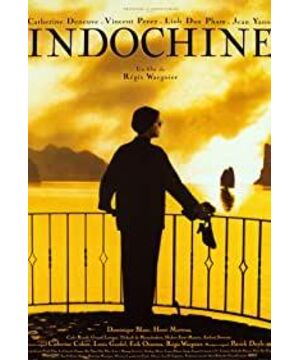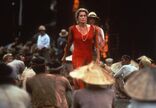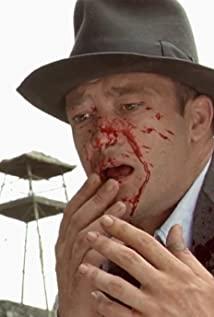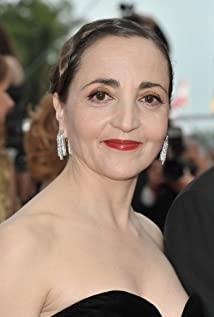Indochina actually includes Cambodia and Laos in addition to Vietnam, but the film takes place in Vietnam. I always felt that Catherine Deneuve looked older when she was young. I didn't think she was particularly good-looking, but she was the most delicious when she was in her 40s and 50s. It's a pity that I searched for a long time, and there are no good subtitles, and many places have turned people's heads. Feel free to write down some of your own understanding and questions, I hope someone can answer. Eliane, played by Catherine Deneuve, is a wealthy single woman whom Austen once said in the novel no one dares to laugh at a wealthy unmarried woman. Indeed, Eliane was respected by both the French colonists and the Vietnamese royal family.
When Eliane falls in love with Jean, a young officer, her father is angry, and the subtitles say that he doesn't want Elaine to leave her. It seems that her father's blocking may be the reason why she has been single. But it's not an incestuous relationship, Elaine's father has a little lover in Vietnam. Maybe her father felt that no one in the area was worthy of her daughter, let alone the young Jean. Anyway, being rich is self-willed, and there is nothing wrong with being single. It can be seen that Elaine has many admirers and lovers, has her own career, and can adopt children as her own.
Dominique Blanco seems to be a courtesan who is attached to others. He was very good with Elaine at the beginning. Elaine wore different clothes every time he appeared, but the floral dress of the courtesan was repeatedly worn twice. The economic conditions are evident. Maybe it was the rubber plantation that caught fire, and Elaine drove her away out of cost savings? The courtesan fell out with Elaine, and then the police chief (subtitle translated as "Jia") who was attached had a crush on Elaine. He went to the opium shop to find the frustrated Elaine, but unfortunately Elaine had no feelings for her.
Jean reappeared after leaving Elaine, learning abacus with a woman who apparently spoke Cantonese. There were also two subtitles saying that the local people attacked Chinese officials, but they always felt that it was wrong. At that time, China had no power in Vietnam, and people would not dress like Chinese. It is indeed very similar to the Qing Dynasty in China.
Originally, Elaine's adopted daughter, Camille, was still thinking of the childhood sweetheart in France, and Jean's hero saved the beauty, so she naturally fell in love with Jean. No girl could resist this feeling. Jean appeared at the dance and was slapped by Elaine. Jean also beat Elaine, which is unacceptable in Western society, and his superiors punished him heavily. Although the subtitles are very vague, I agree with the discussion forum that Jean didn't have feelings for Camille at that time, and loved Elaine. After all, Jean still can't conquer a woman like Elaine, Elaine is like a combination of Gone with the wind's Scarlet and the heroine who walked out of Africa.
Jean is also a very contradictory person, like when he burned a boat suspected of being an opium dealer, but he couldn't bear it. He sympathized with the Vietnamese, but was reprimanded by the Vietnamese while fleeing. The position has been swaying constantly. In the end, whether the French or the Vietnamese killed him, it seems that both have motives. In addition, the clothes in Catherine Deneuve's film are too beautiful and classic, regardless of skirts and trousers, they are not out of date now.
View more about Indochine reviews











